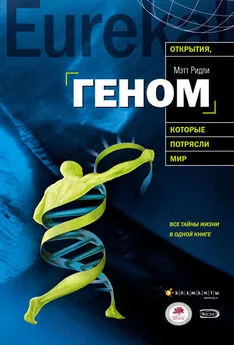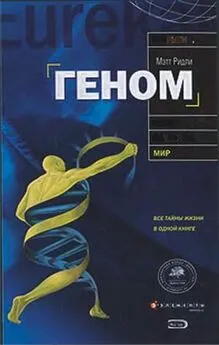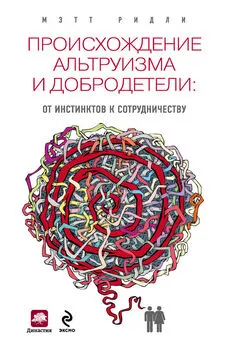Мэтт Ридли - Геном: автобиография вида в 23 главах
- Название:Геном: автобиография вида в 23 главах
- Автор:
- Жанр:
- Издательство:Эксмо
- Год:2008
- Город:Москва
- ISBN:978-5-699-30682-4
- Рейтинг:
- Избранное:Добавить в избранное
-
Отзывы:
-
Ваша оценка:
Мэтт Ридли - Геном: автобиография вида в 23 главах краткое содержание
Генетика развивается столь стремительно, что уследить за тем, как изменяются наши представления о фундаментальных основах жизни и наследственности, не успевает не только широкая публика, но и специалисты. Это порождает массу слухов и домыслов о страшных мутантах, которых коварные ученые штампуют в своих лабораториях, тогда как поразительные открытия новых методов диагностики и лечения генетических заболеваний, включая рак, остаются незамеченными или непонятыми. Книга Мэтта Ридли очень актуальна. Просто и доступно автор представил историю генетики от первых догадок до ошеломляющего прорыва, начавшегося с открытия структуры ДНК Уотсоном и Криком.
На английском языке книга вышла в свет в конце 1999 года, в канун нового тысячелетия. Но эта книга по-прежнему занимает топовые позиции в рейтингах продаж по всему миру. В ней есть то, что не устаревает: дух научных открытий и история генетики, представленная со всем драматизмом споров, дискуссий, озарений одних ученых и черной завистью других.
Геном: автобиография вида в 23 главах - читать онлайн бесплатно ознакомительный отрывок
Интервал:
Закладка:
67
Gopnik M., Goad H. 1997. What underlies inflectional error patterns in genetic dysphasia? Journal of Neurolinguistics 10: 109–138;
Gopnik M. 1999. Familial language impairment: more English evidence. Folia Phonetica et Logopedia 51: 5–9.
68
Pinker S. 1994. The language instinct: the new science of language and mind . Penguin, London.
69
Mineka S., Cook M. 1993. Mechanisms involved in the observational conditioning of fear. Journal of Experimental Psychology: General 122: 23–38.
70
Dawkins R. 1986. The blind watchmaker . Longman, Essex.
71
Amos W., Harwood J. 1998. Factors affecting levels of genetic diversity in natural populations. Philosophical Transactions of the Royal Society of London, Series B 353: 177–186.
72
Rice W. R., Holland B. 1997. The enemies within: intergenomic conflict, interlocus contest evolution (ICE), and the intraspecific Red Queen. Behavioral Ecology and Sociobiology 41: 1–10.
73
Majerus M. et al. 1996. Evolution: the four billion year war . Longman, Essex.
74
Swain A. et al. 1998. Dax1 antagonizes Sry action in mammalian sex determination. Nature 391: 761–767.
75
Hamilton W. D. 1967. Extraordinary sex ratios. Science 156: 477–488.
76
Amos W., Harwood J. 1998. Factors affecting levels of genetic diversity in natural populations. Philosophical Transactions of the Royal Society of London, Series B 353: 177–186.
77
Rice W. R. 1992. Sexually antagonistic genes: experimental evidence. Science 256: 1436–1439.
78
Haig D. 1993. Genetic conflicts in human pregnancy. Quarterly Review of Biology 68: 495–531.
79
Holland B., Rice W. R. 1998. Chase-away sexual selection: antagonistic seduction versus resistance. Evolution 52: 1–7.
80
Rice W. R., Holland B. 1997. The enemies within: intergenomic conflict, interlocus contest evolution (ICE), and the intraspecific Red Queen. Behavioral Ecology and Sociobiology 41: 1–10.
81
Hamer D. H. et al. 1993. A linkage between DNA markers on the X chromosome and male sexual orientation. Science 261: 321–327;
Pillard R. C., Weinrich J. D. 1986. Evidence of familiar nature of male homosexuality. Archive of General Psychiatry 43: 808–812.
82
Bailey J. M., Pillard R. C. 1991. A genetic study of male sexual orientation. Archives of General Psychiatry 48: 1089–1096;
Bailey J. M., Pillard R. C. 1995. Genetics of human sexual orientation. Annual Review of Sex Research 6: 126–150.
83
Hamer D. H. et al. 1993. A linkage between DNA markers on the X chromosome and male sexual orientation. Science 261: 321–327.
84
Bailey J. M. et al. A family history study of male sexual orientation: no evidence for X-linked transmission. Behaviour Genetics , in press.
85
Blanchard R. 1997. Birth order and sibling sex ratio in homosexual versus heterosexual males and females. Annual Review of Sex Research 8: 27–67.
86
Blanchard R., Klassen R 1997. H-Y antigen and homosexuality in men. Journal of Theoretical Biology 185: 373–378;
Arthur B. I. et al. 1998. Sexual behaviour in Drosophila is irreversibly programmed during a critical period. Current Biology 8: 1187–1190.
87
Hamilton W. D. 1995. Narrow roads of gene land . Vol. 1. W. H. Freeman, Basingstoke.
88
Пример взят из статьи Susan Blackmore. 1997. The power of the meme meme. Skeptic Vol. 5, № 2, p. 45.
89
Kazazian H. H., Moran J. V. 1998. The impact of L1 retrotransposones on the human genome. Nature Genetics 19: 19–24.
90
Casane D. et al. 1997. Mutation pattern variation among regions of the primate genome. Journal of Molecular Evolution 45: 216–226.
91
Doolittle W. F., Sapienza C. 1980. Selfish genes, the phenotype paradigm and genome evolution. Nature 284: 601–603;
Orgel I. E., Crick F. H. C. 1980. Selfish DNA: the ultimate parasite. Nature 284: 604–607.
92
McClintock B. 1951. Chromosome organisation and genetic expression. Cold Spring Harbor Symposia on Quantitative Biology 16: 13–47.
93
Yoder J. A. et al. 1997. Cytosine methylation and the ecology of intragenomic parasites. Trends in Genetics 13: 335–340.
94
Jeffreys A. J. et al. 1985. Hypervariable ‘minisatellite’ regions in human DNA. Nature 314: 67–73.
95
Reilly P. R., Page D. C. 1998. We’re off to see the genome. Nature Genetics 20: 15–17.
96
Ridrey M. 1993. The Red Queen: sex and the evolution of human nature . Viking, London.
97
Crow J. F. 1993. Felix Bernstein and the first human marker locus. Genetics 133: 4–7.
98
Yamomoto F. et al. 1990. Molecular genetic basis of the histo-blood group ABO system. Nature 345: 229–233.
99
Dean A. M. 1998. The molecular anatomy of the ancient adaptive event. American Scientist 86: 26–37.
100
Gilbert S. C. et al. 1998. Association of malaria parasite population structure, HLA and immunological antagonism. Science 279: 1173–1177.
101
Pier. G. B. et al. 1998. Salmonella typhi uses CFTR to enter intestinal epithelial cells. Nature 393: 79–82.
102
Hill A. V. S. 1996. Genetics of infectious disease resistance. Current Opinion in Genetics and Development 6: 348–353.
103
Ridley M. 1997. Diseases . Phoenix, London.
104
Cavalli-Sforza L. L., Cavalli-Sforza F. 1995. The great human diasporas . Addison Wesley, Reading, Massachusetts.
105
Wederkind C., Füri S. 1997. Body odour preferences in men and women: do they aim for specific MHC combinations or simply heterogeneity? Proceedings of the Royal Society of London, Series B 264: 1471–1479.
106
Hamilton W. D. 1990. Memes of Haldane and Jayakar in a theory of sex. Journal of Genetics 69: 17–32.
107
Martin P. 1997. The sickening mind: brain, immunity and disease . Harper Collins, London.
108
Becker J. B. et al. 1992. Behavioral endocrinology . MIT Press, Cambridge, Massachusetts.
109
Marmot et al. 1991. Health inequalities among British civil servants: the Whitehall II study. Lancet 337: 1387–1393.
110
Sapolsky R. M. 1997. The trouble with testosterone and other essays on the biology of the human predicament . Touchstone Press, New York.
111
Folstad I., Karter A. J. 1992. Parasites, bright males and the immunocompetence handicap. American Naturalist 139: 603–622.
112
Zuk M. 1992. The role of parasites in sexual selection: current evidence and future directions. Advances in the Study of Behaviour 21: 39–68.
113
Hamer D., Copeland P. 1998. Living with our genes . Doubleday, New York.
114
Efran J. S., Greene M. A., Gordon D. E. 1998. Lessons of the new genetics. Family Therapy Networker 22: 26–41.
115
Kagan J. 1994. Galen’s prophesy: temperament in human nature . Basic Books, New York.
116
Wurtman R. J., Wurtman J. J. 1994. Carbohydrates and depression. In: Masters R. D., McGuire M. T. (eds), The neurotransmitter revolution , p. 96–109. Southern Illinois University Press, Carbondale and Edwardsville.
117
Kaplan J. R. et al. 1996. Influence of dietary lipids on agonistic and affiliative behavior in Macaca fascicularis. American Journal of Primatology 38: 333–347.
118
Raleigh M. J., McGuire M. T. 1994. Serotonin, aggression and violence in vervet monkeys. In: Masters R. D., McGuire M. T. (eds), The neurotransmitter revolution , p. 129–145. Southern Illinois University Press, Carbondale and Edwardsville.
119
Bateson W. 1894. Materials for the study of variation . Macmillan, London.
120
Tautz D., Schmid K. J. 1998. From genes to individuals: developmental genes and the generation of the phenotype. Philosophical Transactions of the Royal Society of London, Series B 353: 231–240.
121
Nüsslein-Volhard J., Wieschaus E. 1980. Mutations affecting segment number and polarity in Drosophila . Nature 287: 795–801.
122
McGinnis et al. 1984. A homologous protein coding sequence in Drosophila homeotic genes and its conservation in other metazoans. Cell 37: 403–408;
Scott M., Weiner A. J. 1984. Structural relationships among genes that control development: sequence homology between the Antennapedia , Ultrabithorax , and fushi tarazu loci of Drosophila . Proceedings of the National Academy of Science of the USA 81: 4115–4119.
123
Arendt D., Nubler-Jung K. 1994. Inversion of the dorso-ventral axis? Nature 371: 26.
124
Sharman A. C., Brand M. 1998. Evolution and homology of the nervous system: cross-phylum rescues of otd / Otx genes. Trends in Genetics 14: 211–214.
125
Duboule D. 1995. Vertebrate hox genes and proliferation — an alternative pathway to homeosis. Current Opinion in Genetics and Development 5: 525–528;
Krumlauf R. 1995. Hox genes in vertebrate development. Cell 78: 191–201.
126
Zimmer C. 1998. At the water’s edge . Free Press, New York.
127
Cavalli-Sforza L. 1998. The DNA revolution in population genetics. Trends in Genetics 14: 60–65.
128
Jensen M. 1998. All about Adam. New Scientist , 11 July: 35–39.
129
Сведения приводились в Интернет-издании HMS Beagle: The Biomednet Magazine , www.biomednet.com/hmsbeagle, issue 20, November 1997.
130
Интервал:
Закладка:



![Twelve Angel - Супер Ген Бога. Том 13 [1201-1300 главы]](/books/1077409/twelve-angel-super-gen-boga-tom-13-1201.webp)
![Twelve Angel - Супер Ген Бога. Том 12 [1101-1200 главы]](/books/1077410/twelve-angel-super-gen-boga-tom-12-1101.webp)
![Twelve Angel - Супер Ген Бога. Том 11 [1001-1100 главы]](/books/1077411/twelve-angel-super-gen-boga-tom-11-1001.webp)
![Twelve Angel - Супер Ген Бога. Том 10 [901-1000 главы]](/books/1077412/twelve-angel-super-gen-boga-tom-10-901.webp)
![Twelve Angel - Супер Ген Бога. Том 9 [801-900 главы]](/books/1077413/twelve-angel-super-gen-boga-tom-9-801-900-glavy.webp)
![Twelve Winged Dark Burning Angel - Супер Ген Бога. Том 2 [101-200 главы]](/books/1080401/twelve-winged-dark-burning-angel-super-gen-boga-tom-2-101-200-glavy.webp)

